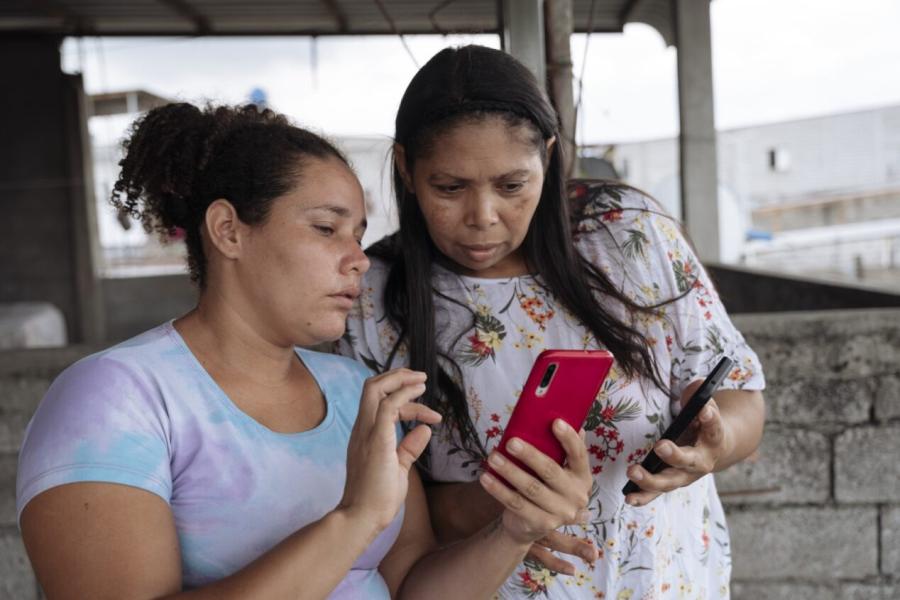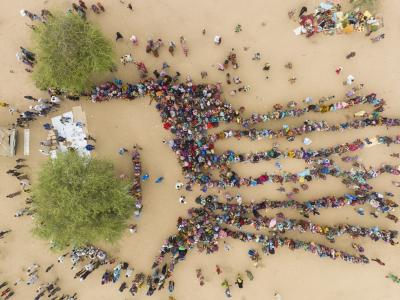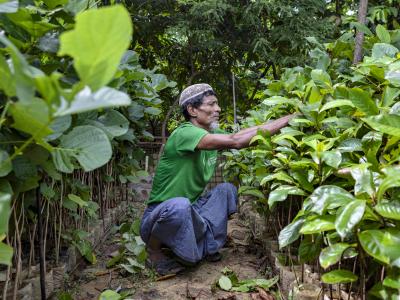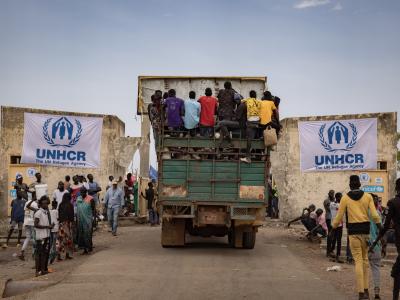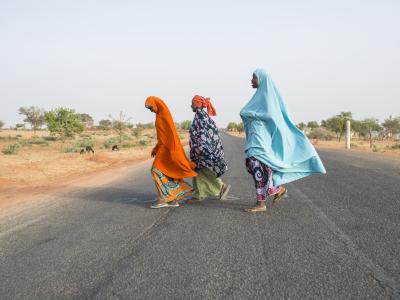To strengthen UNHCR’s organization-wide commitment to Accountability to Affected People (AAP) in 2023, it implemented activities across the four pillars outlined in its five-year AAP plan:
-
operational and regional support;
-
capacity-building and tools;
-
research and advocacy;
-
protection leadership and coordination.
540 UNHCR and partner staff took part in training to learn how to put the plan into operation.
UNHCR conducted regional and country-level assessments on AAP to inform the prioritization and allocation of resources, in order to ensure that decision-making on UNHCR programming is influenced by forcibly displaced and stateless people.
In Southern Africa, UNHCR conducted a regional self-assessment to measure progress in advancing in AAP and inform strategic planning. 27 UNHCR and partner staff in the Democratic Republic of the Congo (DRC) participated in a workshop to reflect on the findings of the AAP self-assessment. As a result, more resources were put into strengthening feedback and response mechanisms in the DRC.
UNHCR took major steps to ensure forcibly displaced people had access to safe two-way communication channels, to raise their concerns and inform programming.
Out of 132 UNHCR country operations collecting this data in 2023, 67% reported that they had multi-channel feedback and response systems that were designed based on consultations with displaced and stateless people. This was a slight reduction from 69% in 2022, a decline ascribed to improved regional analysis, based on the coverage and quality of available mechanisms.
In Asia and the Pacific, a comprehensive mapping survey across 20 countries assessed existing feedback and response mechanisms, focusing on data analysis and management. To address identified challenges of data management at regional level, UNHCR established a harmonized feedback and response system in Afghanistan, the Islamic Republic of Iran and Bangladesh. A regional analysis of feedback and response mechanisms was also conducted across nine country operations in Southern Africa.
UNHCR strengthened contact centres in several regions. In Europe, the Regional Contact Centre for the Ukraine response launched in December 2022 was operational in Hungary and Poland, responding to nearly 300 calls per day. In addition to providing information and identifying and referring people in need of protection, the contact centre also served as a safe and voluntary reporting channel for cases related to fraud, sexual exploitation, and abuse allegations.
UNHCR’s contact centres in Egypt, Iraq, Jordan, Lebanon and Libya responded to 1 million queries, covering feedback, cash assistance, registration, resettlement, health, and legal protection needs. This included 62,000 calls from Sudanese refugees and asylum-seekers arriving in neighbouring countries after the start of the crisis and in critical need of information on rights, procedures, entitlements, and services.
In line with UNHCR’s digital transformation strategy, UNHCR scaled up the roll-out of digital tools, enhancing efforts to make information more accessible and user-friendly to displaced communities and to allow individuals to determine the best way to communicate and provide feedback to UNHCR, including during emergencies.
UNHCR’s multilingual Help sites played a central role in providing people with information and making them aware of available services. In 2023, 31 countries across Africa, Asia, the Middle East and Europe launched their Help sites, including Sudan at the start of the crisis. By the end of the year, Help sites existed in 136 countries, recording some 10 million visitors, with at least 30,000 referrals to services facilitated through these digital channels.
In 2023 WhatsApp messaging was promoted through 16 pilot WhatsApp Turn.io chatbots for refugees and asylum-seekers. This system was used by 75,000 people, with almost 145,000 all-time users since its introduction.
In the Americas, UNHCR established a social media platform in Spanish, responding to direct messages and engaging in trends analysis, updating messages, and guiding operations. More than 1,400 messages were addressed, largely requests for information or humanitarian assistance. 45 sensitive protection cases were identified and referred for protection case management services.
In collaboration with Meta and as part of the Ukraine refugee response, UNHCR launched two rounds of Facebook ad campaigns, reaching 5.2 million viewers. The campaigns were tailored towards families and women travelling alone or with children, on protection risks while on the move, including those connected to trafficking, sexual exploitation and abuse, and misinformation.
In Asia and the Pacific, UNHCR conducted an analysis of practices on disability-inclusive AAP, informing the development of tools and guidance for enhancing disability inclusion. Additional research was conducted to explore the potential and risks of using digital tools to support mental health and psychosocial support services for forcibly displaced adolescents. The research emphasised the need to co-design interventions with displaced youth and made recommendations to address existing barriers and challenges.
In 2023, UNHCR leveraged the Digital Innovation Fund and the Environment and Climate Action Fund to promote community-led solutions to misinformation and harmful content. In Hungary, where Ukrainians and other refugees encountered risks when they sought information on employment and services through digital channels, UNHCR facilitated a community-based system for identifying and reporting harmful content online, informed by community consultations and a roundtable discussion.
In Jakarta, Indonesia, UNHCR piloted a community-led approach to co-create and deliver digital literacy training to refugees from different backgrounds, in partnership with five refugee-led organizations.
UNHCR engaged in inter-agency coordination fora on AAP, co-leading two workstreams under the IASC Task Force devoted to AAP, respectively on the development of guidance for collective feedback and developing a training package and standing operating procedures on AAP coordination in emergencies. In collaboration with UNICEF, CDAC Network and the German Centre for Peace Operations, UNHCR supported a global training course on AAP in emergencies with participants from UN agencies and standby partners.
UNHCR collaborated with the Geneva Centre for Humanitarian Studies and other IASC Task Force members to deliver a 12-week AAP certificate course for practitioners. UNHCR also shared its experience and lessons learned on AAP with ILO, contributing to the development of an ILO internal online learning journey on compliance and accountability.
The year marked significant progress towards an organization-wide improvement of several aspects of AAP, in line with the core actions of UNHCR’s "Age, gender and diversity policy”. This included improving organizational indicators to measure AAP, particularly by refining methodologies to measure access to feedback and response mechanisms, from self-assessment to community-based surveys. The evaluative evidence on UNHCR’s approach to AAP was the brought together in a synthesis report.
More efforts are needed to demonstrate the impact of AAP investments more broadly on UNHCR programming. In addition, the sustained progress made in exploring new channels of communication and feedback, including digital ones, needs to be matched with adequate human resources necessary to respond to the more complex cases and instances raised by individuals and communities, and which require human action and support to “close the feedback loop”.
